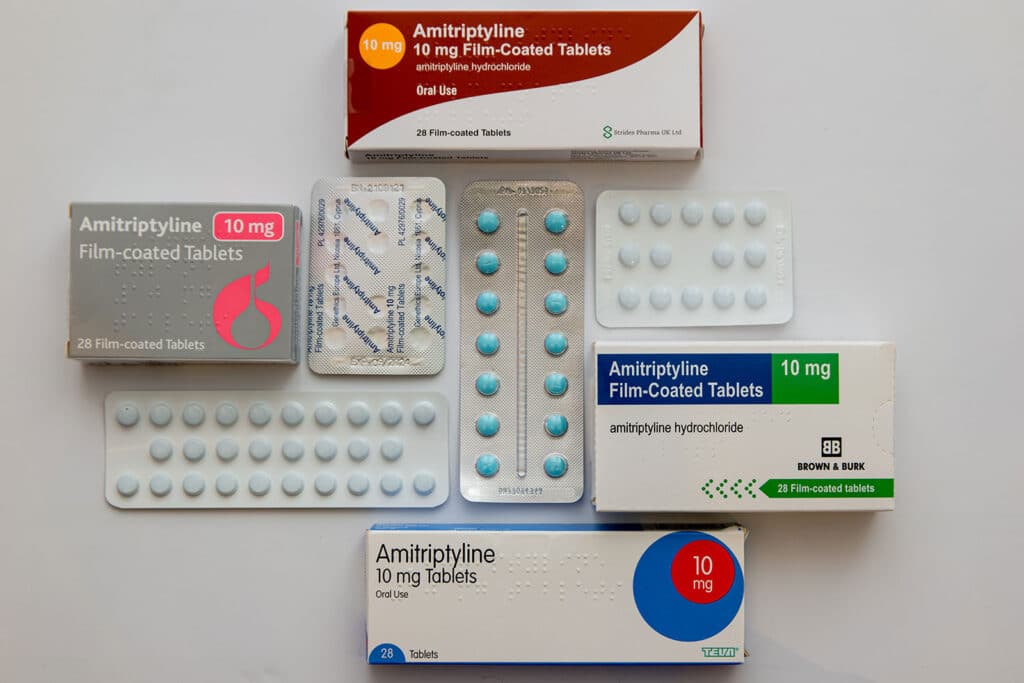Amitriptyline hydrochloride was initially manufactured as Elavil and was one of the most popular early antidepressant drugs. Although the brand Elavil is no longer sold, the generic amitriptyline hydrochloride is still available today. In addition to treating depression, physicians often prescribe a tricyclic antidepressant to treat neuropathic pain. It is also used to treat some anxiety disorders, and it even has uses in treating nocturnal bedwetting for children. As it is with other prescription drugs, withdrawal can occur with Elavil. It is essential to know what causes withdrawal, how to recognize it, and what to do.

Table of Contents
- 1 What Causes Amitriptyline Withdrawal?
- 2 Signs of Amitriptyline Withdrawal
- 3 How Long Do Withdrawal Symptoms Last?
- 4 Treating Withdrawal From Amitriptyline
- 5 Risks of Amitriptyline Dependence
- 6 Detox for Amitriptyline Dependence or Misuse
- 7 Finding Help for Amitriptyline Detox and Withdrawal in New Jersey
- 8 FAQ
What Causes Amitriptyline Withdrawal?
The main reason for withdrawal is stopping the use of amitriptyline. A person may stop using it altogether and suddenly. More severe side effects may be associated with suddenly stopping amitriptyline after using it for a long time or taking a larger dose. When stopping the medication, whether to discontinue treatment or switch to a different antidepressant, it is crucial to taper off to minimize withdrawal symptoms properly. A professional can guide how to taper off, offering specific dosing recommendations based on the current dose.
Signs of Amitriptyline Withdrawal
The signs of withdrawal may vary from one person to another. While some people may experience a broad spectrum of symptoms, others may only notice a few. The effects of withdrawal are not as severe as with medications that have a much higher potential for abuse. Withdrawal from the drug is often called antidepressant discontinuation syndrome, or ADS. These are some of the most common symptoms that people experience when they stop taking amitriptyline.
Flu-Like Feelings
Especially when a person takes a larger dose of amitriptyline, it is common to feel like the flu hits after discontinuing the drug. People often feel like their muscles are achy, weak, or tired. They may have chills, and some people may develop a low-grade fever. Sweating is also common, with or without chills. It is also common to feel exhausted and have achy joints.
Headaches and Pain
Because amitriptyline effectively treats several types of pain, discontinuing it can bring a swift return to the original pain. Headaches are common after stopping the drug, and this is incredibly uncomfortable for people who use amitriptyline to treat frequent migraines.
Mood Changes
As it is with discontinuing an antidepressant, stopping the use of amitriptyline can come with a variety of mood-related shifts. Although withdrawal can be more uncomfortable for people who take the drug for depression or anxiety, mood changes and psychological effects may also happen to people who take it for pain and then discontinue it. These are some of the possible psychological or mood-related symptoms:
- Irritability
- Strange dreams
- Memory changes
- Restlessness
- Insomnia
- Hallucinations
- Crying
- Difficulty concentrating
- Depression or anxiety
- Panic attacks
- Suicidal thoughts
Hypersensitivity
Amitriptyline affects multiple neurotransmitters in the brain and blocks some of them. Because it alters how the brain functions, stopping the drug suddenly can cause a flurry of changes as the brain tries to adjust. As this happens, it is common to feel hypersensitivity to light, sound, or other stimulants in the environment. That hypersensitivity can be distressing, leading to crying spells, mood swings, and a rollercoaster of different feelings.

How Long Do Withdrawal Symptoms Last?
The short answer is one to three weeks. However, the most noticeable symptoms will usually occur within a few days of stopping the medication. This may not be the case for all people. For example, some people may notice more severe symptoms after a week. While many people experience mild symptoms, others may have more severe ones. The good news is that most discomfort, especially flu-like symptoms, will resolve quickly. People who experience lasting psychological symptoms may need additional treatment. Because of the risks of psychological changes, it is vital to have professional supervision during withdrawal.
Treating Withdrawal From Amitriptyline
Withdrawal from amitriptyline, commonly marketed as Elavil (elavil withdrawal), necessitates a nuanced approach tailored to each individual’s dosage and sensitivity. While some may successfully taper off the medication under the guidance of a professional from the comfort of their homes, others with a history of severe mental health conditions may require more intensive treatment during the withdrawal process. This differentiation underscores the absence of a universal tapering regimen applicable to all cases.
Individuals that experience withdrawal symptoms from amitriptyline can manifest differently and may include tiredness, among other potential effects. The withdrawal timeline duration and intensity of these symptoms vary, further emphasizing the importance of personalized treatment plans. Healthcare professionals are adept at crafting tapering schedules that minimize discomfort and prevent adverse effects, drawing on their expertise to determine the optimal duration for each reduced dosage.
Consideration of the type of antidepressant medication, along with adherence to FDA regulations, is integral to the withdrawal process. While amitriptyline is generally well-tolerated, transitioning to alternative medications with potentially fewer side effects may be beneficial for some individuals. This transition should be undertaken under medical supervision to ensure a smooth and safe tapering process.
In cases where individuals develop dependence on amitriptyline, supervised detox programs offer valuable support. These programs provide a structured environment for managing withdrawal symptoms and addressing any underlying issues contributing to dependence. Through collaboration with healthcare professionals, individuals can navigate the withdrawal process with confidence, paving the way for a successful transition to alternative supplement treatments and improved well-being.

Risks of Amitriptyline Dependence
Although amitriptyline has a lower abuse potential than some other prescription drugs prescribed to treat pain, such as opioids, people can still misuse it. For instance, someone with depression or anxiety may take amitriptyline and start taking a larger-than-recommended dose after experiencing a traumatic event. As the brain and body adjust to the larger quantity, the person may become dependent on the drug over time. A person who takes amitriptyline for pain may take larger doses over time to treat additional or increasing pain.
Taking large doses of amitriptyline over time can lead to cardiac changes and signs of toxicity. These are some of the potential side effects of taking too much amitriptyline:
- Irregular heartbeat or rapid heart rate
- Low blood pressure
- Labored or slowed respiration
- Dry mouth
- Difficulty urinating
- Constipation
- Nausea or vomiting
- Vision changes
An overdose may also lead to unconsciousness or other severe adverse effects. Anyone who suspects an amitriptyline overdose should call 911 immediately.
Detox for Amitriptyline Dependence or Misuse
Detoxification from amitriptyline, a common medication used to treat conditions such as bipolar disorder and chronic pain, is a crucial process for individuals who have become dependent on or misused the drug. Amitriptyline, sold under various brand names, is an antidepressant medication known for its effectiveness in managing mood disorders and alleviating pain. However, its potential for misuse and dependence necessitates a structured detox program under medical supervision.
Amitriptyline has a half-life ranging from 10 to 28 hours, indicating that it takes several days for the drug to completely leave the body. Even after cessation, traces of amitriptyline can linger in bodily fluids, with detectable levels in urine for up to a month and in hair for up to three months. Despite these lingering traces, detoxification is essential to break the cycle of dependence and prevent further misuse.
Individuals who have taken amitriptyline for extended periods or at high doses may require medical intervention to detoxify from the drug safely. Under the guidance of healthcare professionals specializing in psychiatry and addiction medicine, a detox program addresses the physical, mental, and spiritual aspects of the individual’s well-being. Medical supervision ensures that uncomfortable symptoms, such as drowsiness and disruptions to the nervous system, are managed effectively.
Moreover, seeking medical advice before initiating a detox program is paramount, especially considering the potential risks associated with the abrupt discontinuation of amitriptyline. Healthcare providers can offer personalized guidance based on the individual’s medical history and current needs, minimizing the risk of withdrawal symptoms and complications.
It’s important to note that detoxification from amitriptyline should always be conducted under the supervision of qualified healthcare professionals. This article serves as a general overview and does not constitute medical advice. Individuals considering a detox program should consult with their healthcare provider for personalized recommendations and guidance.
In conclusion, detoxification from amitriptyline dependence or misuse requires a comprehensive approach that addresses the unique needs of each individual. Through medical supervision, individuals can safely navigate the process, leading to improved well-being and reduced risk of further harm.

Finding Help for Amitriptyline Detox and Withdrawal in New Jersey
If you or someone you know is planning to stop using amitriptyline, we are here to help. We especially encourage anyone who has a history of substance misuse or mental health struggles to work with us to safely detox from amitriptyline or any other prescription drug that affects brain function. Detoxing can come with a wide range of emotions, which may lead to unsafe thoughts or behavior. When discontinuing amitriptyline after misuse, the temptation to relapse and take a large dose exists for people who experience physical or psychological discomfort.
At Garden State Treatment Center, we take a customized approach to substance misuse and mental health treatment. Since many substance misuse problems stem from mental health conditions, we simultaneously use dual diagnosis treatment to address all co-occurring issues. We offer multiple therapy structures at our Sparta facility, including addiction treatment options, treatment of depression, antidepressant withdrawal, amitriptyline withdrawal symptoms and withdrawal effects recovery, and others utilizing various practical approaches that help people learn behavior causes or triggers and develop strategies to overcome or cope with life’s issues and life-threatening cases. To learn more about amitriptyline withdrawal and detox in New Jersey, don’t hesitate to get in touch with us.
FAQ
What are amitriptyline withdrawal symptoms?
How do I manage dizziness as a withdrawal symptom after stopping using Amitriptyline?
Published on: 2021-11-21
Updated on: 2025-01-01



